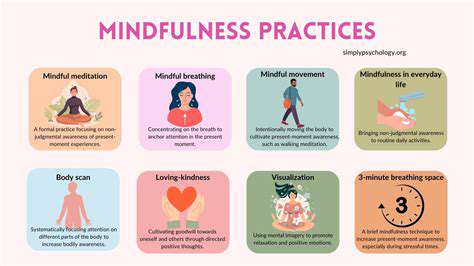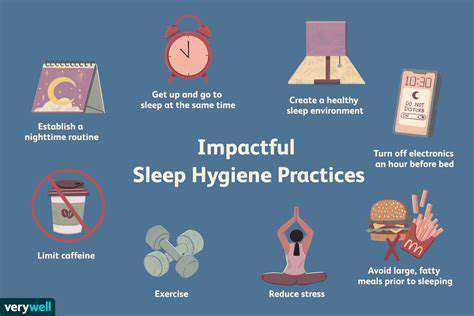How to Create a Healthy Evening Routine
The Importance of a Consistent Evening Routine
Establishing a Relaxing Pre-Sleep Environment
Creating a calming atmosphere in your bedroom is crucial for signaling to your body that it's time to wind down. Dim the lights, ideally using warm-toned bulbs, and consider using a white noise machine or calming music to block out distractions. A relaxing scent, like lavender essential oil diffused gently, can also help soothe the senses and promote a sense of tranquility, preparing your body and mind for a restful night's sleep. This consistent environment reinforces the association between your bedroom and sleep, making it easier to fall asleep and wake up feeling refreshed.
A comfortable temperature is also essential. Adjust the thermostat to a cool but not excessively cold temperature, as this can help regulate your body's internal temperature and promote sleep. Make sure your bedding is soft, comfortable, and appropriate for the temperature. These small details, when consistently implemented, create a powerful sleep-inducing atmosphere that contributes to the overall effectiveness of your evening routine.
Prioritizing Mindfulness and Self-Care
Incorporating mindfulness practices into your evening routine can significantly reduce stress and promote relaxation. Taking a few minutes for meditation or deep breathing exercises can help calm your racing thoughts and prepare you for sleep. This practice can also help manage anxiety and improve overall well-being, leading to better sleep quality. Consistency in these practices is key to reaping the benefits of mindfulness in your evening routine.
Engaging in activities that you enjoy and that help you disconnect from work or daily stressors is another important aspect of a healthy evening routine. This could be reading a book, listening to calming music, taking a warm bath, or engaging in a hobby. Making time for activities that bring you joy and help you disconnect from the day's demands can contribute significantly to a sense of calm and well-being, preparing your body and mind for a peaceful night's rest. Remember, it's all about cultivating a sense of calm and relaxation.
Taking care of your physical needs, like a healthy dinner, also plays a vital role in your evening routine. Eating a balanced and healthy dinner well in advance of bedtime will prevent indigestion and the discomfort that can disrupt sleep. Hydration is equally important. Drinking plenty of water throughout the day, but avoiding large quantities close to bedtime, can help prevent dehydration, which can negatively impact sleep quality.
Creating a Relaxing Bedtime Ritual
Establishing a Consistent Routine
A consistent bedtime routine is crucial for regulating your body's natural sleep-wake cycle. This predictable sequence signals to your body that it's time to wind down and prepare for sleep. Consistency is key, even on weekends, as it helps your body anticipate sleep and improves the quality of your sleep. This allows for a smoother transition from wakefulness to sleep, reducing the time it takes to fall asleep and improving overall sleep quality.
Establishing a consistent routine takes time and effort, but the benefits are well worth it. By creating a nightly sequence of activities, you're essentially training your body to recognize the cues associated with sleep, leading to a more relaxed and restorative sleep experience. This predictability helps your body prepare for sleep, reducing stress and promoting better sleep hygiene.
Creating a Calm Atmosphere
A relaxing bedtime ritual should create a serene and calming atmosphere in your bedroom. Dim the lights, opt for soft, calming music, or use a white noise machine to minimize distractions and promote relaxation. A cool temperature in the room also helps signal to your body that it's time to sleep. A calm and quiet environment is essential for promoting a peaceful mind and body, setting the stage for a restful night's sleep.
Consider using aromatherapy with calming scents like lavender or chamomile to further enhance the relaxing ambiance. These scents can help to ease anxiety and promote a sense of tranquility, contributing to a more enjoyable and effective bedtime routine.
Mindfulness and Relaxation Techniques
Incorporating mindfulness and relaxation techniques into your bedtime routine can significantly reduce stress and promote a sense of calm before sleep. Activities like deep breathing exercises, progressive muscle relaxation, or meditation can help clear your mind of racing thoughts and worries. These techniques focus on bringing awareness to the present moment, reducing anxiety and promoting relaxation.
Taking a few minutes each evening to engage in these practices can help you disconnect from the day's stresses and prepare your mind and body for a peaceful sleep. Mindfulness techniques can help quiet the mind, allowing you to fall asleep more easily and experience a more restful night's sleep.
Hydration and Nutrition Considerations
Pay attention to your hydration and nutritional intake in the hours leading up to bedtime. Avoid large meals and sugary drinks close to bedtime, as these can interfere with sleep quality. A light snack of whole-grain crackers or a small bowl of oatmeal might help settle your stomach and promote relaxation, but avoid anything too heavy or rich.
Ensure you're staying hydrated throughout the day, but avoid excessive fluids close to bedtime to minimize nighttime awakenings due to needing to use the restroom. Consider a warm cup of herbal tea with calming ingredients as a gentle way to unwind and prepare for sleep. This can be a soothing and healthy way to complete your bedtime routine.
Engaging in Soothing Activities
Prioritize engaging in activities that promote relaxation and disconnection from work or stressful thoughts. Reading a book, listening to calming music, taking a warm bath, or practicing gentle stretching can all be excellent additions to your bedtime routine. These activities offer a transition from the demands of the day to the tranquility of sleep.
Engaging in these activities helps to create a sense of calm and peacefulness, signaling to your body that it's time to wind down. This promotes better sleep quality and can significantly reduce stress and anxiety, making it easier to fall asleep and stay asleep throughout the night. A well-structured bedtime ritual, incorporating these elements, can contribute significantly to your overall health and well-being.

Mindfulness and Mental Preparation

Understanding the Core Principles of Mindfulness
Mindfulness, at its heart, is the practice of paying attention to the present moment without judgment. It's about observing your thoughts, feelings, and sensations as they arise, without getting carried away by them. This non-judgmental observation allows you to develop a greater awareness of your internal experience, leading to a more balanced and stable mental state.
Developing this awareness is crucial for mental preparation. It allows you to recognize patterns in your thinking and emotional responses, which can be valuable tools for managing stress and anxiety. By practicing mindfulness, you cultivate a sense of calm and clarity that can significantly improve your overall mental well-being.
Cultivating Focus and Concentration
Mindfulness exercises, such as focusing on your breath or observing your surroundings, are powerful tools for improving concentration. Regular practice helps to train your mind to stay present and resist distractions. This heightened focus can have a significant impact on your performance in various areas of life.
By cultivating focused attention, you enhance your ability to be fully engaged in whatever you are doing. This improved focus translates into better decision-making, increased productivity, and a greater sense of accomplishment.
Managing Stress and Anxiety
Mindfulness is a powerful tool for managing stress and anxiety. When you're stressed or anxious, it's easy to get caught up in negative thoughts and worries. Mindfulness practices, such as body scans and mindful breathing exercises, help you to detach from these overwhelming feelings and cultivate a sense of calm.
By practicing mindfulness, you learn to observe these feelings without getting swept away by them. This allows you to respond to stressful situations with greater clarity and composure.
Through consistent practice, you can develop a resilience to stress, and effectively manage anxious thoughts.
Improving Emotional Regulation
Mindfulness promotes emotional regulation by fostering self-awareness. By observing your emotions as they arise, you gain a deeper understanding of their triggers and patterns. This awareness empowers you to respond to your feelings in a more constructive and balanced way.
Recognizing the connection between your thoughts, feelings, and actions is key to emotional regulation. This understanding allows you to manage your emotional responses more effectively and prevent emotional reactivity from interfering with your goals and daily life.
Enhancing Self-Awareness
Mindfulness practices deepen self-awareness by illuminating the subtle nuances of your internal experience. It allows you to recognize your thoughts, emotions, and physical sensations without judgment, creating a clearer understanding of yourself.
This self-knowledge is invaluable for personal growth and development. By understanding your internal landscape, you can make conscious choices about your behavior and cultivate a more fulfilling life.
The Benefits of Mental Preparation for Performance
Preparing mentally for any task, from a challenging work presentation to a competitive sporting event, is crucial for optimal performance. Mindfulness practices can significantly enhance your mental preparedness.
Mindfulness helps to reduce pre-performance anxiety, promote focus, and improve concentration. Ultimately, mental preparation through mindfulness can lead to better results in any endeavor you undertake.
Prioritizing Sleep Hygiene

Establishing a Consistent Sleep Schedule
Maintaining a regular sleep schedule, even on weekends, is crucial for regulating your body's natural sleep-wake cycle. This consistency helps your body anticipate sleep and wake times, promoting better sleep quality and efficiency. A consistent sleep schedule can also improve your mood and energy levels throughout the day, as your body functions optimally when it operates on a predictable rhythm.
Aim for 7-9 hours of sleep per night, and try to go to bed and wake up around the same time each day, even when not working or attending school. This routine will help regulate your body's natural sleep-wake cycle, making it easier to fall asleep and wake up feeling refreshed.
Creating a Relaxing Bedtime Routine
Establishing a relaxing bedtime routine can signal to your body that it's time to wind down and prepare for sleep. This could involve taking a warm bath, reading a book, listening to calming music, or practicing gentle stretching exercises.
Avoid stimulating activities before bed, such as using electronic devices or engaging in intense conversations. These activities can interfere with your body's ability to relax and prepare for sleep.
Optimizing Your Sleep Environment
A conducive sleep environment is critical for quality sleep. Make sure your bedroom is dark, quiet, and cool. Darkness is essential for the production of melatonin, the hormone that regulates sleep.
Consider using blackout curtains, earplugs, or a white noise machine to block out disruptive light and noise. A comfortable temperature, ideally around 65 degrees Fahrenheit, can also significantly improve sleep quality.
Managing Stress and Anxiety
Stress and anxiety can significantly impact your sleep quality. Finding healthy ways to manage these emotions is important for getting a good night's rest.
Stress-reducing techniques such as meditation, deep breathing exercises, or yoga can help calm your mind and promote relaxation. Prioritizing stress management can lead to improved sleep patterns and overall well-being.
Avoiding Caffeine and Alcohol Before Bed
Caffeine and alcohol are known to disrupt sleep patterns. Avoid consuming these substances several hours before bedtime.
Caffeine's stimulating effects can interfere with the natural sleep-wake cycle, making it harder to fall asleep and leading to restless nights. Alcohol, while initially potentially inducing sleepiness, can lead to fragmented sleep and poor sleep quality later in the night.
Dietary Considerations for Better Sleep
The foods you consume can impact your sleep quality. Eating a balanced diet throughout the day can promote better sleep.
Avoid large meals close to bedtime, as they can cause digestive discomfort and interfere with sleep. Consuming foods rich in tryptophan, an amino acid that promotes sleep, can be beneficial. These include turkey, bananas, and milk.
Regular Physical Activity
Engaging in regular physical activity is beneficial for overall health and can positively influence sleep patterns. Physical activity helps regulate your body's natural rhythms, which can improve sleep quality.
However, avoid strenuous exercise too close to bedtime, as it can boost your energy levels and make it harder to fall asleep. Aim for regular exercise, but schedule it earlier in the day.
Read more about How to Create a Healthy Evening Routine
Hot Recommendations
-
*Guide to Managing Gout Through Diet
-
*Best Habits for Financial Well being
-
*How to Build a Routine for Better Mental Health
-
*How to Eat Healthy on a Budget [Tips & Meal Ideas]
-
*Guide to Practicing Self Acceptance
-
*How to Incorporate More Movement Into Your Day
-
*Guide to Managing Chronic Pain Naturally
-
*Guide to Building a Reading Habit for Well being
-
*Top 5 Weight Loss Supplements That Actually Work
-
*Best Exercises for Postpartum Recovery [Beyond Abdominal Work]

![HIIT Workout for Fat Loss [20 Minute Routine]](/static/images/26/2025-05/Exercises28Example293A.jpg)

![Best Books on Mental Health and Well being [Recommended Reads]](/static/images/26/2025-05/CultivatingSelf-CompassionandPositiveSelf-Talk.jpg)







![How to Read Nutrition Labels Correctly [Expert Tips]](/static/images/26/2025-06/MakingInformedChoices3ATakingControlofYourDiet.jpg)